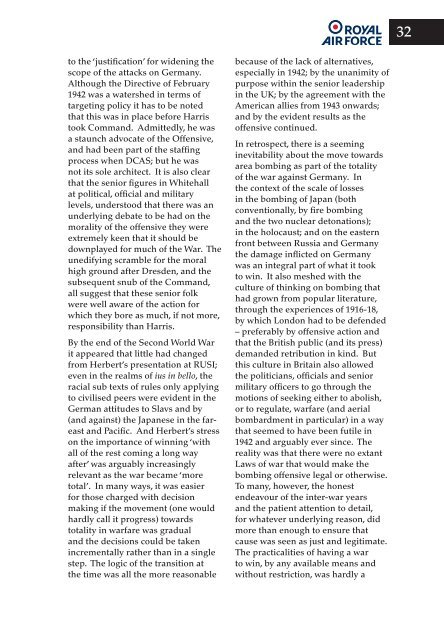The Qur'an and War - Air Power Studies
The Qur'an and War - Air Power Studies
The Qur'an and War - Air Power Studies
Create successful ePaper yourself
Turn your PDF publications into a flip-book with our unique Google optimized e-Paper software.
32<br />
to the ‘justification’ for widening the<br />
scope of the attacks on Germany.<br />
Although the Directive of February<br />
1942 was a watershed in terms of<br />
targeting policy it has to be noted<br />
that this was in place before Harris<br />
took Comm<strong>and</strong>. Admittedly, he was<br />
a staunch advocate of the Offensive,<br />
<strong>and</strong> had been part of the staffing<br />
process when DCAS; but he was<br />
not its sole architect. It is also clear<br />
that the senior figures in Whitehall<br />
at political, official <strong>and</strong> military<br />
levels, understood that there was an<br />
underlying debate to be had on the<br />
morality of the offensive they were<br />
extremely keen that it should be<br />
downplayed for much of the <strong>War</strong>. <strong>The</strong><br />
unedifying scramble for the moral<br />
high ground after Dresden, <strong>and</strong> the<br />
subsequent snub of the Comm<strong>and</strong>,<br />
all suggest that these senior folk<br />
were well aware of the action for<br />
which they bore as much, if not more,<br />
responsibility than Harris.<br />
By the end of the Second World <strong>War</strong><br />
it appeared that little had changed<br />
from Herbert’s presentation at RUSI;<br />
even in the realms of ius in bello, the<br />
racial sub texts of rules only applying<br />
to civilised peers were evident in the<br />
German attitudes to Slavs <strong>and</strong> by<br />
(<strong>and</strong> against) the Japanese in the fareast<br />
<strong>and</strong> Pacific. And Herbert’s stress<br />
on the importance of winning ‘with<br />
all of the rest coming a long way<br />
after’ was arguably increasingly<br />
relevant as the war became ‘more<br />
total’. In many ways, it was easier<br />
for those charged with decision<br />
making if the movement (one would<br />
hardly call it progress) towards<br />
totality in warfare was gradual<br />
<strong>and</strong> the decisions could be taken<br />
incrementally rather than in a single<br />
step. <strong>The</strong> logic of the transition at<br />
the time was all the more reasonable<br />
because of the lack of alternatives,<br />
especially in 1942; by the unanimity of<br />
purpose within the senior leadership<br />
in the UK; by the agreement with the<br />
American allies from 1943 onwards;<br />
<strong>and</strong> by the evident results as the<br />
offensive continued.<br />
In retrospect, there is a seeming<br />
inevitability about the move towards<br />
area bombing as part of the totality<br />
of the war against Germany. In<br />
the context of the scale of losses<br />
in the bombing of Japan (both<br />
conventionally, by fire bombing<br />
<strong>and</strong> the two nuclear detonations);<br />
in the holocaust; <strong>and</strong> on the eastern<br />
front between Russia <strong>and</strong> Germany<br />
the damage inflicted on Germany<br />
was an integral part of what it took<br />
to win. It also meshed with the<br />
culture of thinking on bombing that<br />
had grown from popular literature,<br />
through the experiences of 1916-18,<br />
by which London had to be defended<br />
– preferably by offensive action <strong>and</strong><br />
that the British public (<strong>and</strong> its press)<br />
dem<strong>and</strong>ed retribution in kind. But<br />
this culture in Britain also allowed<br />
the politicians, officials <strong>and</strong> senior<br />
military officers to go through the<br />
motions of seeking either to abolish,<br />
or to regulate, warfare (<strong>and</strong> aerial<br />
bombardment in particular) in a way<br />
that seemed to have been futile in<br />
1942 <strong>and</strong> arguably ever since. <strong>The</strong><br />
reality was that there were no extant<br />
Laws of war that would make the<br />
bombing offensive legal or otherwise.<br />
To many, however, the honest<br />
endeavour of the inter-war years<br />
<strong>and</strong> the patient attention to detail,<br />
for whatever underlying reason, did<br />
more than enough to ensure that<br />
cause was seen as just <strong>and</strong> legitimate.<br />
<strong>The</strong> practicalities of having a war<br />
to win, by any available means <strong>and</strong><br />
without restriction, was hardly a
















